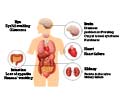
John Collinge and his colleagues at University College London studied the brains of eight people who had died of Creutzfeldt-Jakob disease (CJD), a condition caused by a protein that acts like a virus. CJD can be caused by genetic mutations, by exposure to contaminated foods, in rare cases, from accidental exposures during medical procedures, such as surgery or other invasive treatments.
The proteins that cause this disease are called as ‘prions’ and they are misfolded in nature. These misfolded proteins can grow and break off and seed new growths just like reproduction.
In 1985, there were evidences of children being treated with human growth hormone that was collected from cadavers. Researchers speculate that these children might have been exposed to ‘prions’ and therefore they had a higher risk of CJD.
Since ‘prions’ have a long incubation period, even after 30-40 years after the cessation of using human cadaveric hormones, patients who received those treatments continue to show signs of CJD. In eight autopsy cases studied by Collinge and his team, those prions came from these hormone surgeries.
“What we found, very much to our surprise, was that of the eight patients, four had quite significant, some severe, deposition of amyloid protein, the Alzheimer’s protein. Patients had damage in the blood vessels of their brain typical of Alzheimer’s,” said Collinge.
Advertisement
“What the results do suggest is a need to re-think Alzheimer’s and how it may develop. It’s possible that in addition to being caused by genes and environmental exposures, Alzheimer’s may also, in rare cases, be triggered by exposure to amyloid protein “seeds” that may be passed from one source to another,” he said.
Advertisement
Source-Medindia











